非谓语动词解题五要素
- 格式:doc
- 大小:22.50 KB
- 文档页数:2
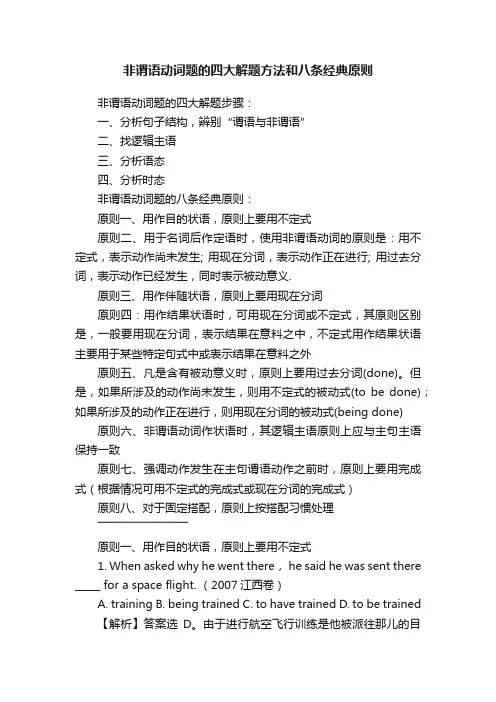
非谓语动词题的四大解题方法和八条经典原则非谓语动词题的四大解题步骤:一、分析句子结构,辨别“谓语与非谓语”二、找逻辑主语三、分析语态四、分析时态非谓语动词题的八条经典原则:原则一、用作目的状语,原则上要用不定式原则二、用于名词后作定语时,使用非谓语动词的原则是:用不定式,表示动作尚未发生; 用现在分词,表示动作正在进行; 用过去分词,表示动作已经发生,同时表示被动意义.原则三、用作伴随状语,原则上要用现在分词原则四:用作结果状语时,可用现在分词或不定式,其原则区别是,一般要用现在分词,表示结果在意料之中,不定式用作结果状语主要用于某些特定句式中或表示结果在意料之外原则五、凡是含有被动意义时,原则上要用过去分词(done)。
但是,如果所涉及的动作尚未发生,则用不定式的被动式(to be done);如果所涉及的动作正在进行,则用现在分词的被动式(being done) 原则六、非谓语动词作状语时,其逻辑主语原则上应与主句主语保持一致原则七、强调动作发生在主句谓语动作之前时,原则上要用完成式(根据情况可用不定式的完成式或现在分词的完成式)原则八、对于固定搭配,原则上按搭配习惯处理――――――――――――――――――原则一、用作目的状语,原则上要用不定式1. When asked why he went there, he said he was sent there _____ for a space flight. (2007江西卷)A. trainingB. being trainedC. to have trainedD. to be trained【解析】答案选D。
由于进行航空飞行训练是他被派往那儿的目的,所以要用不定式,因此可排除A 和B。
另外,由于“他”与“训练”之间为被动关系,故选 D。
2. _____ this cake,you’ll need 2 eggs, 175 g sugar and 175 g flour. (2006广东卷)A. Having madeB. MakeC. To makeD. Making【解析】答案选C。

非谓语动词的做题技巧一、非谓语动词是啥呢?宝子们,非谓语动词就像是英语语法里的一群小机灵鬼。
它呢,不能单独作谓语,但又有着各种各样的作用。
比如说,它可以表示动作的先后顺序,就像在排队一样,谁先谁后可讲究了呢。
它还能表达一些比较复杂的意思,就像我们想描述一个动作正在进行,同时还有其他动作发生的时候,它就派上用场啦。
二、做题小技巧来咯1. 看句子里有没有and,but这些连接词。
要是有呢,前后的动词形式可能要保持一致哦。
就像两个小伙伴手拉手,要穿一样风格的衣服呢。
比如说,I like to read and write. 这里read和write都是用的非谓语动词形式,而且都是to do的形式,是不是很有趣呀?2. 注意句子里的主语哦。
主语就像是老大,非谓语动词要听它的指挥。
如果主语是主动做某个动作,那非谓语动词可能就是现在分词形式。
比如The boy standing there is my brother. 这里的boy是主动站(stand)在那里的,所以stand就变成了standing这种现在分词形式啦。
要是主语是被做某个动作,那非谓语动词可能就是过去分词形式。
像The book written by him isvery popular. 书是被他写(write)的,所以write就变成了written这种过去分词形式呢。
3. 还有哦,有些固定搭配一定要记住。
就像look forward to doing sth,这里的to后面一定要接动名词形式(doing),这是人家规定好的,就像游戏规则一样,可不能乱改哦。
再比如,have trouble in doing sth,也是要接动名词形式的。
要是记不住这些搭配,做题的时候就很容易出错啦。
4. 当我们看到句子里有表示目的的时候,非谓语动词经常会用不定式形式。
比如说,I come here to see you. 我来这里(come here)的目的是看你(to see you),这里的to see就是不定式形式,表示目的呢。
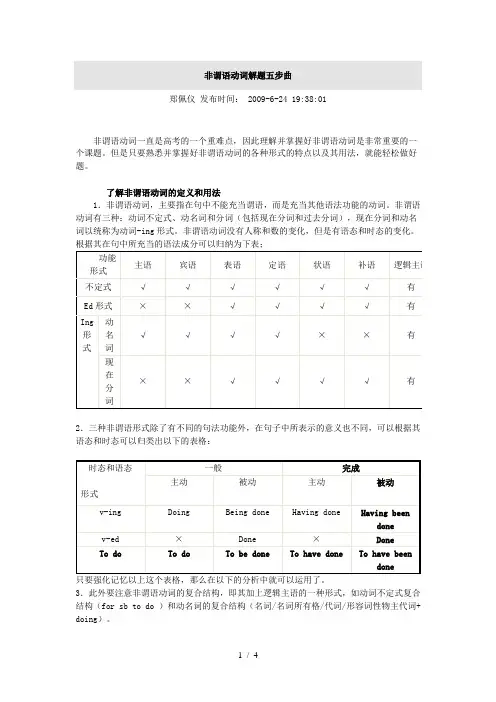
非谓语动词解题五步曲郑佩仪发布时间: 2009-6-24 19:38:01非谓语动词一直是高考的一个重难点,因此理解并掌握好非谓语动词是非常重要的一个课题。
但是只要熟悉并掌握好非谓语动词的各种形式的特点以及其用法,就能轻松做好题。
一、了解非谓语动词的定义和用法1.非谓语动词,主要指在句中不能充当谓语,而是充当其他语法功能的动词。
非谓语动词有三种:动词不定式、动名词和分词(包括现在分词和过去分词),现在分词和动名词以统称为动词-ing形式。
非谓语动词没有人称和数的变化,但是有语态和时态的变化。
根据其在句中所充当的语法成分可以归纳为下表;2.三种非谓语形式除了有不同的句法功能外,在句子中所表示的意义也不同,可以根据其语态和时态可以归类出以下的表格:只要强化记忆以上这个表格,那么在以下的分析中就可以运用了。
3.此外要注意非谓语动词的复合结构,即其加上逻辑主语的一种形式,如动词不定式复合结构(for sb to do )和动名词的复合结构(名词/名词所有格/代词/形容词性物主代词+ doing)。
Eg. It is hard for Mary to get up early.句中It是形式主语,而for Mary to get up early真正的主语,而其中Mary是get up 的逻辑主语。
4.非谓语动词的否定式也是常考的项目,要认清否定形式,非谓语动词的否定都应将not 放在非谓语动词之前,但如该谓语形式前有逻辑主语,则要置于逻辑主语之后,如What is the reason for your not going home..5. 熟记各种非谓语动做相同成分的区别以及一些固定搭配三种非谓语形式在很多情况下都可以做相同的成分,但根据句意和语法结构分析可以区别并判断,如动名词和不定式同时可以做宾语词倾向指经常性发生的事情,而不定式指一次性的事情,如I like playing football very much, but I don’t like to play now.此外还有一些固定搭配,有些动词只能接动名词做宾语,如suggest, risk, look forward to 等;有些动词只接不定式做宾语,如seem, expect, want等;有些动词既可以接动名词又可以接不定式做宾语,如stop, remember, begin等,但句意稍有区别;有些动词可接动名词,且有主动表被动的作用,如want, need, require等。

高中英语非谓语动词考查重点和解题方法归纳非谓语动词属于英语语法的三座大山之一,无论在考试中还是平时的英语阅读中所起的作用都举足轻重。
但是,对于这么重要的语法内容,很多同学们却怎么学都学不透,要么完全不懂、做题时全靠“感觉”;要么一知半解,能跳过则跳过。
其实,只要方法正确,遇到有关非谓语动词的题目时就会迎刃而解,更令人开心的是,在平时的英语阅读中再也不需要绕道而行了!一、非谓语动词的含义非谓语动词首先是一种动词形式,其次是这种动词形式不能做谓语,综合这两点,我们将其叫做非谓语动词。
二、非谓语动词的形式非谓语动词包含四种形式,即不定式、动名词、现在分词和过去分词。
其中,每种形式按照发生时间和主被动又包括不同的子形式。
具体如下:1、不定式①基本形式:to do(表示主动,并且一般表示将来)②被动式:to be done(表示被动,并且一般表示将来)③进行式:to be doing (表示主动和进行)④完成时:to have done(表示主动和完成)⑤完成被动式:to have been done(表示被动和完成)⑥完成进行式:to have been doing (表示主动和完成进行)例如:The teacher told us to do morning exercises .老师让我们做早操。
The car to be bought is for his sister.要买的这辆车是给他的姐姐的。
She pretended to be reading when the teacher came into the classroom.老师进来时,她假装正在读书。
The thief is said to have escaped.据说小偷已经逃跑了。
The thief is said to have been arrested.据说小偷已经被抓住了。
She is said to have been working in the factory over the last 20 years.据说在过去的20年里,她一直在这家工厂工作。
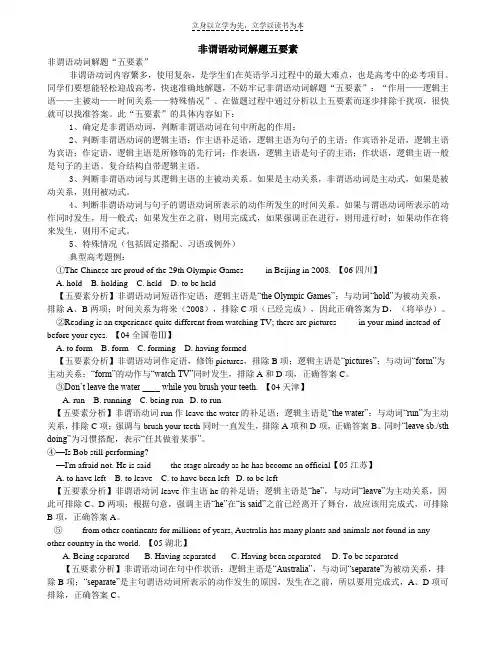
非谓语动词解题五要素非谓语动词解题“五要素”非谓语动词内容繁多,使用复杂,是学生们在英语学习过程中的最大难点,也是高考中的必考项目。
同学们要想能轻松迎战高考,快速准确地解题,不妨牢记非谓语动词解题“五要素”:“作用——逻辑主语——主被动——时间关系——特殊情况”。
在做题过程中通过分析以上五要素而逐步排除干扰项,很快就可以找准答案。
此“五要素”的具体内容如下:1、确定是非谓语动词,判断非谓语动词在句中所起的作用;2、判断非谓语动词的逻辑主语:作主语补足语,逻辑主语为句子的主语;作宾语补足语,逻辑主语为宾语;作定语,逻辑主语是所修饰的先行词;作表语,逻辑主语是句子的主语;作状语,逻辑主语一般是句子的主语。
复合结构自带逻辑主语。
3、判断非谓语动词与其逻辑主语的主被动关系。
如果是主动关系,非谓语动词是主动式,如果是被动关系,则用被动式。
4、判断非谓语动词与句子的谓语动词所表示的动作所发生的时间关系。
如果与谓语动词所表示的动作同时发生,用一般式;如果发生在之前,则用完成式,如果强调正在进行,则用进行时;如果动作在将来发生,则用不定式。
5、特殊情况(包括固定搭配、习语或例外)典型高考题例:①The Chinese are proud of the 29th Olympic Games ____ in Beijing in 2008. 【06四川】A. holdB. holdingC. heldD. to be held【五要素分析】非谓语动词短语作定语;逻辑主语是“the Olympic Games”;与动词“hold”为被动关系,排除A、B两项;时间关系为将来(2008),排除C项(已经完成),因此正确答案为D,(将举办)。
②Reading is an experience quite different from watching TV; there are pictures ____ in your mind instead of before your eyes. 【04全国卷Ⅲ】A. to formB. formC. formingD. having formed【五要素分析】非谓语动词作定语,修饰pictures,排除B项;逻辑主语是“pictures”;与动词“form”为主动关系;“form”的动作与“watch TV”同时发生,排除A和D项,正确答案C。
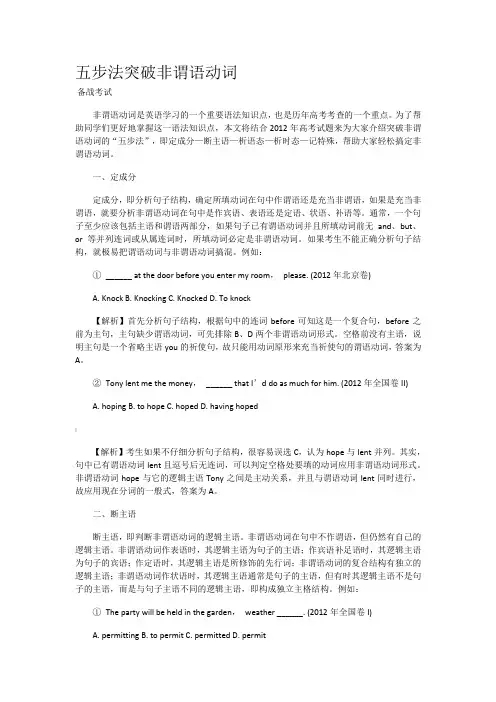
五步法突破非谓语动词备战考试非谓语动词是英语学习的一个重要语法知识点,也是历年高考考查的一个重点。
为了帮助同学们更好地掌握这一语法知识点,本文将结合2012年高考试题来为大家介绍突破非谓语动词的“五步法”,即定成分—断主语—析语态—析时态—记特殊,帮助大家轻松搞定非谓语动词。
一、定成分定成分,即分析句子结构,确定所填动词在句中作谓语还是充当非谓语,如果是充当非谓语,就要分析非谓语动词在句中是作宾语、表语还是定语、状语、补语等。
通常,一个句子至少应该包括主语和谓语两部分,如果句子已有谓语动词并且所填动词前无and、but、or等并列连词或从属连词时,所填动词必定是非谓语动词。
如果考生不能正确分析句子结构,就极易把谓语动词与非谓语动词搞混。
例如:①______ at the door before you enter my room,please. (2012年北京卷)A. KnockB. KnockingC. KnockedD. To knock【解析】首先分析句子结构,根据句中的连词before可知这是一个复合句,before之前为主句,主句缺少谓语动词,可先排除B、D两个非谓语动词形式。
空格前没有主语,说明主句是一个省略主语you的祈使句,故只能用动词原形来充当祈使句的谓语动词,答案为A。
②Tony lent me the money,______ that I’d do as much for him. (2012年全国卷II)A. hopingB. to hopeC. hopedD. having hoped|【解析】考生如果不仔细分析句子结构,很容易误选C,认为hope与lent并列。
其实,句中已有谓语动词lent且逗号后无连词,可以判定空格处要填的动词应用非谓语动词形式。
非谓语动词hope与它的逻辑主语Tony之间是主动关系,并且与谓语动词lent同时进行,故应用现在分词的一般式,答案为A。
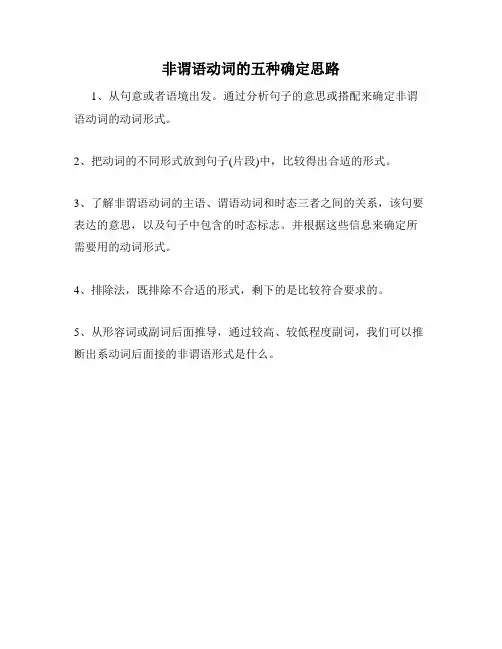
非谓语动词的五种确定思路
1、从句意或者语境出发。
通过分析句子的意思或搭配来确定非谓语动词的动词形式。
2、把动词的不同形式放到句子(片段)中,比较得出合适的形式。
3、了解非谓语动词的主语、谓语动词和时态三者之间的关系,该句要表达的意思,以及句子中包含的时态标志。
并根据这些信息来确定所需要用的动词形式。
4、排除法,既排除不合适的形式,剩下的是比较符合要求的。
5、从形容词或副词后面推导,通过较高、较低程度副词,我们可以推断出系动词后面接的非谓语形式是什么。
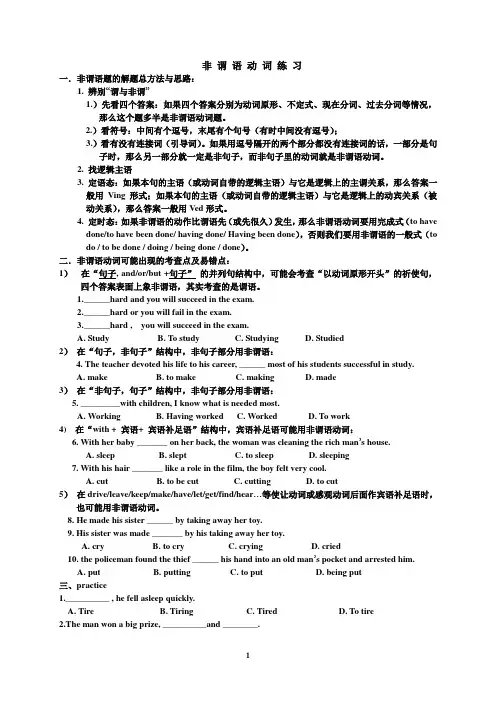
非谓语动词练习一.非谓语题的解题总方法与思路:1. 辨别―谓与非谓‖1.)先看四个答案:如果四个答案分别为动词原形、不定式、现在分词、过去分词等情况,那么这个题多半是非谓语动词题。
2.)看符号:中间有个逗号,末尾有个句号(有时中间没有逗号);3.)看有没有连接词(引导词)。
如果用逗号隔开的两个部分都没有连接词的话,一部分是句子时,那么另一部分就一定是非句子,而非句子里的动词就是非谓语动词。
2. 找逻辑主语3. 定语态:如果本句的主语(或动词自带的逻辑主语)与它是逻辑上的主谓关系,那么答案一般用Ving形式;如果本句的主语(或动词自带的逻辑主语)与它是逻辑上的动宾关系(被动关系),那么答案一般用V ed形式。
4. 定时态:如果非谓语的动作比谓语先(或先很久)发生,那么非谓语动词要用完成式(to havedone/to have been done/ having done/ Having been done),否则我们要用非谓语的一般式(to do / to be done / doing / being done / done)。
二.非谓语动词可能出现的考查点及易错点:1)在“句子, and/or/but +句子”的并列句结构中,可能会考查“以动词原形开头”的祈使句,四个答案表面上象非谓语,其实考查的是谓语。
1.______hard and you will succeed in the exam.2.______hard or you will fail in the exam.3.______hard , you will succeed in the exam.A. StudyB. T o studyC. S tudyingD. Studied2)在“句子,非句子”结构中,非句子部分用非谓语:4. The teacher devoted his life to his career, ______ most of his students successful in study.A. makeB. to makeC. makingD. made3)在“非句子,句子”结构中,非句子部分用非谓语:5. _________with children, I know what is needed most.A. WorkingB. Having workedC. WorkedD. T o work4) 在“with + 宾语+ 宾语补足语”结构中,宾语补足语可能用非谓语动词:6. With her baby _______ on her back, the woman was cleaning the rich man’s house.A. sleepB. sleptC. to sleepD. sleeping7. With his hair _______ like a role in the film, the boy felt very cool.A. cutB. to be cutC. cuttingD. to cut5)在drive/leave/keep/make/have/let/get/find/hear…等使让动词或感观动词后面作宾语补足语时,也可能用非谓语动词。
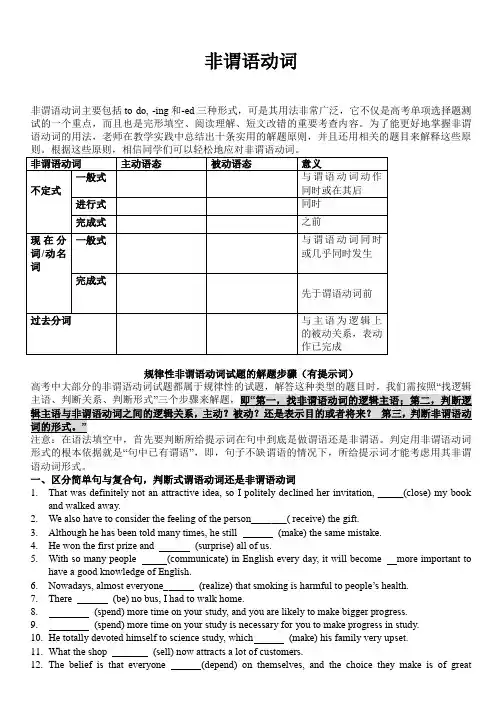
非谓语动词非谓语动词主要包括to do, -ing和-ed三种形式,可是其用法非常广泛,它不仅是高考单项选择题测试的一个重点,而且也是完形填空、阅读理解、短文改错的重要考查内容。
为了能更好地掌握非谓语动词的用法,老师在教学实践中总结出十条实用的解题原则,并且还用相关的题目来解释这些原规律性非谓语动词试题的解题步骤(有提示词)形式的根本依据就是“句中已有谓语”,即,句子不缺谓语的情况下,所给提示词才能考虑用其非谓语动词形式。
一、区分简单句与复合句,判断式谓语动词还是非谓语动词1.That was definitely not an attractive idea, so I politely declined her invitation, _____(close) my bookand walked away.2.We also have to consider the feeling of the person_______( receive) the gift.3.Although he has been told many times, he still (make) the same mistake.4.He won the first prize and (surprise) all of us.5.With so many people (communicate) in English every day, it will become more important to have agood knowledge of English.6.Nowadays, almost everyone_ (realize) that smoking is harmful to people’s health.7.There (be) no bus, I had to walk home.8.(spend) more time on your study, and you are likely to make bigger progress.9.(spend) more time on your study is necessary for you to make progress in study.10.He totally devoted himself to science study, which (make) his family very upset.11.What the shop (sell) now attracts a lot of customers.12.The belief is that everyone (depend) on themselves, and the choice they make is of great importance.非谓语动词在高考中的具体应用一、非谓语动词作状语的题型:1. _________ (see) from the top of the tower, the south foot of the mountain is a sea of trees.2. It rained heavily in the south, _________ (cause) serious flooding in several provinces.3. _________ (complete) the project in time, the staff were working at weekends.二、非谓语动词作定语的题型:1. A great number of students _________ (question) said they were forced to practice the piano.2. Many buildings in the city need repairing, but the one _________ (repair) first is the library.十大解题原则A. Having been toldB. Having toldC. He had been toldD. Though he had been told例2._________ many times, he still couldn’t understand it.A. Having been toldB. Having toldA. Having lostB. LostC. Being lostD. Losing例4. __________, I really believe that I’d prefer not to make any change now.A. Considered all the possibilitiesB. Taking all the possibilities into considerationC. Taken all the possibilities into considerationA. FailB. FailedC. To failD. Having failed例6. Tim Bemers-Lee is generally considered _____ the World Wide Web, on which all the information is shared by all.A. to have foundedB. having foundedA.produced B.being producedC.to be produced D.having been produced例8.The trees _____ in the storm have been moved off the road.A. being blown downB. blown downA. the thief having been caughtB. the thief to be caughtC. catch the thiefD. the thief being caught例10. At the beginning of class, the noise of desks ____ could be heard outside the classroom.A. opened and closedB. to be opened and closedA. CaughtB. Having caughtC. Being caughtD. To catch例12 ___twice a year, whether it is a car or a bus or a truck, is the rule that every driver must obey in this city.A. ExaminingB. ExaminedA. comparingB. comparesC. to compareD. compared例14 _______ with a difficult situation, Arnold decided to ask his boss for advice.A. Being bittenB. BittenC. Having bittenD. To be bitten例16._______ in the fields on a March afternoon, he could feel the warmth of spring.A. To walk.B. WalkingC. WalkedD. Having walked例17. While watching television, __________.A. the doorbell rangB. the doorbell ringsC. we heard the doorbell ringD. we heard the doorbell rings例18. The children went home from the grammar school, their lessons ____ for the day.A. Being a winnerB. To be a winnerC. Be a winnerD. Having been a winner例20. The news reporters hurried to the airport, only _______ the film stars had left.A. to tellB. to be toldC. tellingD. told例21. The glass doors have taken the place of the wooden ones at the entrance, ________ in the natural light during the day.A. to letB. lettingC. letD. having let例22.How glad I am ___________ you!A. Not realizedB. Not to realizeC. Not realizingD. Not to have realized例24. What worried him most was ______ to visit his sick child.A. his being not allowedB. his not being allowedC. his not allowingD. having not been allowed例25. Sarah has decided ________ away on holiday this summer.A. don’t goB. to not goC. not goingD. not to go考点突破,真题演练单句填空:用括号中所给动词的适当形式填空。
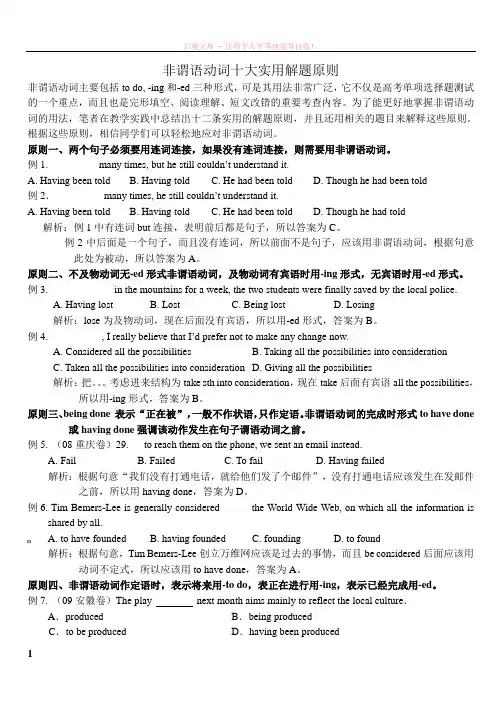
非谓语动词十大实用解题原则非谓语动词主要包括to do, -ing和-ed三种形式,可是其用法非常广泛,它不仅是高考单项选择题测试的一个重点,而且也是完形填空、阅读理解、短文改错的重要考查内容。
为了能更好地掌握非谓语动词的用法,笔者在教学实践中总结出十二条实用的解题原则,并且还用相关的题目来解释这些原则。
根据这些原则,相信同学们可以轻松地应对非谓语动词。
原则一、两个句子必须要用连词连接,如果没有连词连接,则需要用非谓语动词。
例1. _________ many times, but he still couldn’t understand it.A. Having been toldB. Having toldC. He had been toldD. Though he had been told例2._________ many times, he still couldn’t understand it.A. Having been toldB. Having toldC. He had been toldD. Though he had told解析:例1中有连词but连接,表明前后都是句子,所以答案为C。
例2中后面是一个句子,而且没有连词,所以前面不是句子,应该用非谓语动词,根据句意此处为被动,所以答案为A。
原则二、不及物动词无-ed形式非谓语动词,及物动词有宾语时用-ing形式,无宾语时用-ed形式。
例3. ____________ in the mountains for a week, the two students were finally saved by the local police.A. Having lostB. LostC. Being lostD. Losing解析:lose为及物动词,现在后面没有宾语,所以用-ed形式,答案为B。
例4. __________, I really believe that I’d prefer not to make any change now.A. Considered all the possibilitiesB. Taking all the possibilities into considerationC. Taken all the possibilities into considerationD. Giving all the possibilities解析:把。
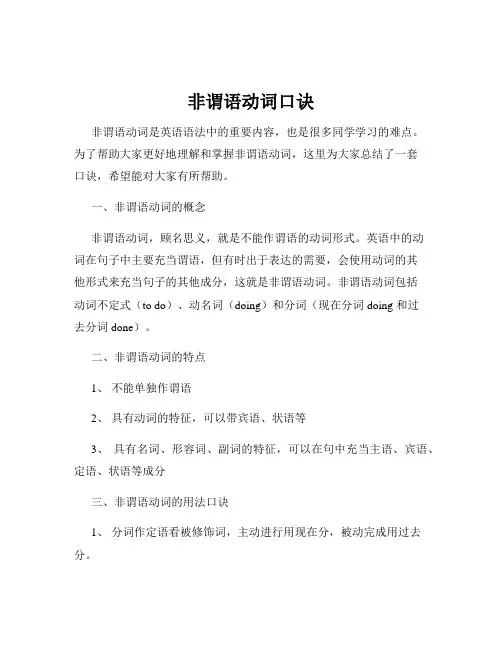
非谓语动词口诀非谓语动词是英语语法中的重要内容,也是很多同学学习的难点。
为了帮助大家更好地理解和掌握非谓语动词,这里为大家总结了一套口诀,希望能对大家有所帮助。
一、非谓语动词的概念非谓语动词,顾名思义,就是不能作谓语的动词形式。
英语中的动词在句子中主要充当谓语,但有时出于表达的需要,会使用动词的其他形式来充当句子的其他成分,这就是非谓语动词。
非谓语动词包括动词不定式(to do)、动名词(doing)和分词(现在分词 doing 和过去分词 done)。
二、非谓语动词的特点1、不能单独作谓语2、具有动词的特征,可以带宾语、状语等3、具有名词、形容词、副词的特征,可以在句中充当主语、宾语、定语、状语等成分三、非谓语动词的用法口诀1、分词作定语看被修饰词,主动进行用现在分,被动完成用过去分。
例如:The smiling girl is my sister(“smiling”表示“正在笑的”,与“girl”是主动关系,用现在分词)再如:The broken window needs to be repaired(“broken”表示“被打破的”,与“window”是被动关系,用过去分词)2、分词作状语看其与主语关系,主动进行用现在分,被动完成用过去分。
例如:Seeing from the top of the hill, we can have a better view (“seeing”与“we”是主动关系,用现在分词)又如:Seen from the top of the hill, the city looks beautiful(“seen”与“the city”是被动关系,用过去分词)3、不定式作目的状语常放句首,作后置定语与被修饰词有动宾关系。
例如:To catch the early bus, he got up early(“To catch”表示目的,放在句首)再如:I have a lot of work to do(“to do”作后置定语,与“work”有动宾关系,即“do work”)4、动名词作主语表一般、抽象动作,作宾语常跟某些动词短语。
. 非谓语动词的做题步骤:1。
判定是否用非谓语动词形式。
方法:看句子中是否有了谓语动词2。
找非谓语动词的逻辑主语方法:非谓语动词的逻辑主语一般是句子的主语3。
判定主被动关系方法:非谓语动词与其逻辑主语的主动还是被动关系4。
判定时间关系方法:分析句子,看看非谓语动词所表示的动作发生在谓语动词动作之前,之后还是同时。
之前常用done,之后用to do , 同时一般用doing .一。
非谓语动词作为主语和表语的比较1。
不定式和动名词作为主语和表语(1). 不定式表示一次性的,具体的动作;ing 常表示一般的,泛指的或者是习惯性的动作——is a good form of exercise for both young and old .A. the walk B . WalkingC . To walkD . Walk分析:a good form 暗示泛指一般的行为,用动名词作主语(2). 不定式做主语时,常用it 作形式主语,即用句型:it is+ adj. / n. (for / of sb. ) to do sth .如:It is very important for us to learn English well.It is very kind of you to help us.注意:下面几个句型是用动名词:It is no use / good doing sth .It’s useless doing sth(3)在seem / appear (似乎,好像)prove / turn out (被证明是),remain (仍然是,尚待) 等连系动词后,可以用不定式作表语。
如:He seemed ( to be ) very happy .二。
不定式,动名词作宾语的比较:1。
只能接不定式的动词:(1)想要:want, would like, would ,prefer, ask, demand , intend,desire(2) 希望:wish , hope ,expect(3) 决定:agree ,decide , manage , plan , promise , choose , continue ,prepare ,make up one’s mind , try one’s best , apply ,offer(4) happen ,learn , fail , pretend , refuse , afford.2. 只能接动名词的动词:suggest , advise (建议),finish , mind (介意),enjoy (喜欢),appreciate (鉴赏,感激),forbid (禁止),avoid (避免),can’t help doing (忍不住), feel like (想要),delay, put off (推迟),give up (放弃),be busy 忙于),be worth (值得),practice (练习)3.接不定式与接动名词意义不同的动词remember to do 记得去做;remember doing 记得做过remember to do 记得去做;remember doing 记得做过forget to do 忘记去做;forget doing 忘记做过了regret to do 遗憾去做;regret doing 后悔做过try to do 设法去做;try doing 试着做go on to do 接着做另一件事;go on doing 继续做同一件事mean to do 打算做;mean doing 意味着做stop to do 停下来去做;stop doing 停止做can’t help (to) do 不能帮助做;can’t help doing 忍不住做4.要接动名词的几个句型prevent / stop / keep sb. / sth, from doing … ( 阻止…做)spend / waste time / money in doing sth .have some difficulty / trouble /problems in doing ( 在做…有困难)have a hard / good time in doing sth.5.含介词to 的短语look forward to (盼望);devote…to 致力于,献身于be / get used to 习惯于;lead to 导致equal to 等于,能胜任;pay attention to 注意refer to 谈到;所指,涉及belong to6。
一、关于动词适当形式的解题思路★★时态(8种基本时态)谓语动词——时间状语、语境——语态(主动+被动)动词即将发生——不定式(to do)非谓语动词——和中心词的逻辑关系正在发生、主动——现在分词(doing)已经完成、被动——过去分词(done)充当名词——动名词(doing)主语转成不定式置于句末。
It is good for your health to do exercises regularly.It is impossible to solve all the problems at once.某些特殊的形式主语结构,依然和动名词连用。
It is no use/good crying over the spilt milk.易与不定式混淆。
如:pay attention to, look forward to, be/get used to, be related/linked to, be the key to,be on one’s way to, make contributions to, devote……to, thanks to, in addition to, objectto, prefer……to(仅限至本单元止已学过的动词,后学的请补充)②尤其关注后接不定式和动名词时,区别很大的动词。
I forgot to return the money to you. 我忘记要还钱给你了。
(钱未还)I forgot returning the money to you. 我忘记已经还过你钱了。
(钱已还)The headmaster have meant to put off the sports meeting. 校长打算推迟运动会。
The heavy rain means putting off the sports meeting. 大雨意味着运动会推迟了。
Tom tried to walk again after his leg was badly hurt.(Tom努力地行走) If you feel too full, you can try walking after a meal. (你可以尝试着走走)The computer needs repairing. = The computer needs to be repaired.③有些动词接动名词做宾语,但接不定式做宾补。
非谓语“鹿、兔、鹰”之五步解题突破法对于学生来讲,在高中英语学习与考试中,最难的一个专题首数非谓语,其次是定语从句、时态与语态、句子分析与特殊句式等。
学好非谓语,做好与非谓语有关的题目,具有极其重要的意义。
它可提高写作的档次,还可以提高对英语句子结构的认识及灵活处理句子中动词的能力。
本人根据多年教学的实践与经验,总结出了便于教学操作和学生理解的非谓语五步解题法,即:一步判断成是非,连词主语是依据,二步找其逻主语,自前谓前它独居,三步分析态与时,先态后时比动词,四步结构莫忽视,约定俗称真省事。
五步综合定形式,步步为营要落实。
下面我就按照这五个步骤来一一为你呈现非谓语的最科学的解题思路。
一步判断成是非,连词主语是依据。
即第一步要判断所填的空是老虎(谓语),还是小动物(非谓语)鹿、兔、鹰。
这一步非常关键,它关系到所填的空是“老虎”(谓语),还是“小动物鹿、兔、鹰”(非谓语)的一个方向性问题,是一个大是大非的问题,所以我把这一步放在第一步。
如果是非谓语,应该分析它是什么成份。
那么怎样来判断所填动词是谓语(老虎)还是非谓语(鹿、兔、鹰)呢?一般来说一个句子只能有一个谓语(并列谓语除外)。
如果一个句子已经有了一个谓语,那么另外一个动词只能作非谓语。
如果谓语之外的动词一定要作谓语使用,那就需要放置在另外一个句子里,这时这一句与原先的一句便形成了我们常见的并列句或复合句。
两句之间就要有并列连词或丛属连词(界河)来连接。
连词与主语是我们在现有已知条件下判断一个空是谓语(老虎)与小动物(非谓语)的有力且快捷的依据.其中以非谓语作状语的判断稍显复杂。
主要有两种类型1)———( )———, 连词+主语+谓语。
2)———( )———,主语+谓语。
在1)型中,已知句句首有连词(界河),说明前面一定是一个句子(一座山),如果没有谓语(老虎)的话,所填的空一定是谓语动词;在2)型中,后面的已知句子句首无连词,在前面所填的空中,根据两个变量连词与主语的四种情况会大体上出现两大类四小类情况。
非谓语动词的做题步骤:1. 判定是谓语还是非谓语。
方法:找谓语动词。
如果句子已经有了谓语动词,要用的动词有下列情况:1)并列谓语(应有连词and,but,or等);2)并列句或从句谓语(应有从句、连词或分号“;”);3)非谓语动词(作主、宾、表、定、状、补等成分)。
2. 找非谓语动词的逻辑主语。
1)一般是句子的主语;2)定语的逻辑主语是所修饰词;3)宾语补足语的逻辑主语是宾语;4)独立主格结构的逻辑主语是分词前名词或代词。
3. 判断主被动关系。
方法:确定非谓语动词与其逻辑主语是主动还是被动关系。
4. 判断时间关系。
方法:分析句子,看非谓语动词动作发生在谓语动作之前、之后还是同时。
之前常用done; 之后常用to do; 同时常用doing。
注意:这些只用于一般情况,注意特殊情况,如:有些动词只接不定式作宾语,而有些动词只能接动词-ing形式作宾语。
再如:judging from等一类短语已是固定结构。
例如:1)The storm left, _____ a lot of damage to this area.A. causedB. have causedC. to causeD. having caused分析:(1)判断是谓语还是非谓语:句中left是谓语,cause要用非谓语形式,排除B项;(2)找逻辑主语:cause是“The storm left”的结果状语,逻辑主语是句子主语the storm;(3)判断主被动:cause a lot of damage是由the storm发出的,所以是主动,排除A(caused 作非谓语时是过去分词,表被动);(4)判断先后关系:cause damage与谓语动词left前已经发生,要用表示动作已经发生的having done。
答案:D。
2)______many times, he still couldn’t understand it .A. Having been toldB. Being toldC. He had been toldD. Though he was told分析:(1)判断是谓语还是非谓语:句中couldn’t understand是谓语,没有并列句连词and、but、so等,排除C;选项D是让步状语从句,但是many times经常用完成时表示强调,排除D。
非谓语动词解题五要素非谓语动词解题“五要素”非谓语动词内容繁多,使用复杂,是学生们在英语学习过程中的最大难点,也是高考中的必考项目。
同学们要想能轻松迎战高考,快速准确地解题,不妨牢记非谓语动词解题“五要素”:“作用——逻辑主语——主被动——时间关系——特殊情况”。
在做题过程中通过分析以上五要素而逐步排除干扰项,很快就可以找准答案。
此“五要素”的具体内容如下:1、确定是非谓语动词,判断非谓语动词在句中所起的作用;2、判断非谓语动词的逻辑主语:作主语补足语,逻辑主语为句子的主语;作宾语补足语,逻辑主语为宾语;作定语,逻辑主语是所修饰的先行词;作表语,逻辑主语是句子的主语;作状语,逻辑主语一般是句子的主语。
复合结构自带逻辑主语。
3、判断非谓语动词与其逻辑主语的主被动关系。
如果是主动关系,非谓语动词是主动式,如果是被动关系,则用被动式。
4、判断非谓语动词与句子的谓语动词所表示的动作所发生的时间关系。
如果与谓语动词所表示的动作同时发生,用一般式;如果发生在之前,则用完成式,如果强调正在进行,则用进行时;如果动作在将来发生,则用不定式。
5、特殊情况(包括固定搭配、习语或例外)典型高考题例:①The Chinese are proud of the 29th Olympic Games ____ in Beijing in 2008. 【06四川】A. holdB. holdingC. heldD. to be held【五要素分析】非谓语动词短语作定语;逻辑主语是“the Olympic Games”;与动词“hold”为被动关系,排除A、B两项;时间关系为将来(2008),排除C项(已经完成),因此正确答案为D,(将举办)。
②Reading is an experience quite different from watching TV; there are pictures ____ in your mind instead of before your eyes. 【04全国卷Ⅲ】A. to formB. formC. formingD. having formed【五要素分析】非谓语动词作定语,修饰pictures,排除B项;逻辑主语是“pictures”;与动词“form”为主动关系;“form”的动作与“watch TV”同时发生,排除A和D项,正确答案C。
③Don’t leave the water ____ while you brush your teeth. 【04天津】A. runB. runningC. being runD. to run【五要素分析】非谓语动词run作leave the water的补足语;逻辑主语是“the water”;与动词“run”为主动关系,排除C项;强调与brush your teeth同时一直发生,排除A项和D项,正确答案B。
同时“leave sb./sth doing”为习惯搭配,表示“任其做着某事”。
④—Is Bob still performing?—I'm afraid not. He is said____ the stage already as he has become an official【05江苏】A. to have leftB. to leaveC. to have been leftD. to be left【五要素分析】非谓语动词leave作主语he的补足语;逻辑主语是“he”,与动词“leave”为主动关系,因此可排除C、D两项;根据句意,强调主语“he”在“is said”之前已经离开了舞台,故应该用完成式,可排除B项,正确答案A。
⑤____ from other continents for millions of years, Australia has many plants and animals not found in any other country in the world. 【05湖北】A. Being separatedB. Having separatedC. Having been separatedD. To be separated【五要素分析】非谓语动词在句中作状语;逻辑主语是“Australia”,与动词“separate”为被动关系,排除B项;“separate”是主句谓语动词所表示的动作发生的原因,发生在之前,所以要用完成式,A、D项可排除,正确答案C。
⑥ _____ automatically the e-mail will be received by all the club members. 【06上海】A. Mailed outB. Mailing outC. To be mailed outD. Having mailed out【五要素分析】非谓语动词作方式状语,排除C项(不定式表目的);逻辑主语“the e-mail”与动词“mail”为被动关系,排除B项和D项,正确答案A。
⑦While watching television, ____.【05全国卷III】A. the doorbell rangB. the doorbell ringsC. we heard the doorbell ringD. we heard the doorbell rings 【五要素分析】此题需要逆向思维:根据已知的非谓语动词来判断正确的主句。
非谓语动词短语作状语,“watching”的逻辑主语只能是“we”而不可能是“the doorbell”,即可排除A和B项;ring作宾语补足语不能用单数第三人称,正确答案C。
⑧It’s neces sary to be prepared for a job interview. ____ the answers ready will be of great help. 【05北京】A. To have hadB. Having hadC. HaveD. Having【五要素分析】非谓语动词在句中作“will be of”的主语,排除C项;该动词在此处表示一种普遍行为,用动名词表示,排除A;A项和B项表示动词已经发生,不合句意,可排除。
正确答案D。
⑨After he became conscious, he remembered _______ and ________ on the head with a rod. 【06江西】A. to attack; hitB. to be attacked; to be hitC. attacking; be hitD. having been attacked; hit【五要素分析】特殊情况:“remember”接动名词的一般式或完成式均表示“记得已经发生过的事”,答案应选D。
⑩— There is a story here in the paper about a 110-year-old man.—My goodness! I can’t imagine _________ that old. 【06江苏】A. to beB. to have beenC. beingD. having been【五要素分析】固定搭配:“imagine”后只接动名词作宾语,排除A、B两项;此处非谓语动词表示未发生的动作,故排除D项,正确答案C。
以上高考真题基本上代表了非谓语动词各个不同类型的考查方式和特点。
可以看出,并非每道题都要全面考虑以上“五要素”,有时只需考虑一两个要素即可得到答案。
我相信,只要同学们在训练中严格按照这种思路去分析,就可以练就一双火眼金睛,那么,再难的考查非谓语动词的试题都是可以快速得到答案的。
试一试:1. ____ of the meeting of the next day, the manager immediately sat down to make some preparations for it.A. RemindingB. RemindedC. Having remindedD. To be reminded2. The problem just referred to is ____ at the next meeting.A. to discussB. discussedC. discussingD. to be discussed3. Can you imagine what great difficulty I had ____ the singer?A. to contactB. contactedC. contactingD. to be contacted4. It was ____ that caused him to serve dinner an hour later than usual.A. we being lateB. our being lateC. we were too lateD. because we were late5. This method, ____ in some areas near Hangzhou, ____ in a marked rise in total production.A. tried; resultedB. trying; resultingC. trying; resultedD. tried; resulting6. With a lot of difficult problems ____, the manager felt worried all the time.A. being settledB. settlingC. settledD. to settle7. ____ good, the food was soon sold out.A. TastingB. TastedC. Being tastedD. Having tasted8. From the dates ____ on the gold coin, we decided that it was made five hundred years ago.A. markingB. markedC. to be markedD. having been marked。